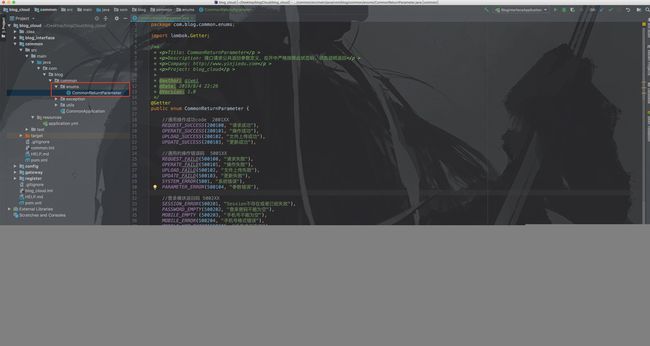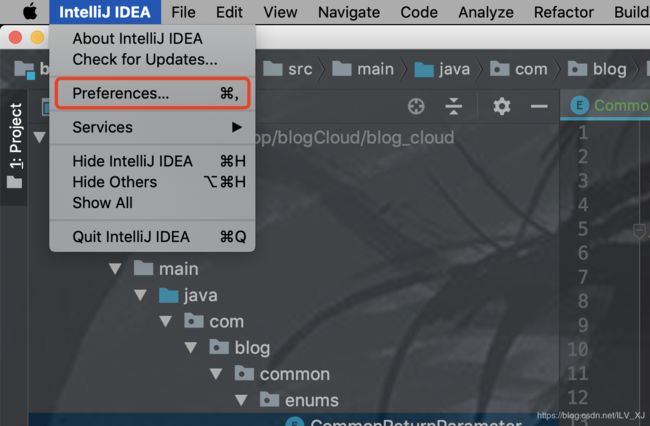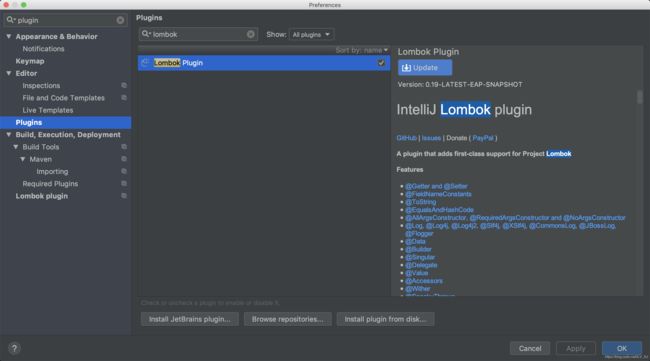common公共类code
项目代码已上传到gitLab上面,
地址为:
https地址:https://gitlab.com/open_sources/blog_cloud.git
ssh地址:[email protected]:open_sources/blog_cloud.git
通过上一章《SpringCloud开发个人博客项目(框架搭建)》,可以搭建出一个springCloud的项目雏形,今天将项目使用到的公共类做一个编码,主要涉及到项目公共返回参数、全局异常处理类、工具类、校验器、静态常量、接口返回规则等的定义,在自己实际开发过程中,可以根据自己的需求,自己添加相应代码,这节主要是做一个common类的基本架子,后面在开发过程中,我们户会添加更多的公共方法、参数等,下面进入本节的主题。
1. 公共返回参数
在建好的的项目模块common下添加enums包,然后创建枚举类CommonReturnParameter,如下图:
按照上图添加返回参数规则,目前代码如下:
package com.blog.common.enums;
import lombok.Getter;
/**
* Title: CommonReturnParameter
* Description: 接口请求公共返回参数定义,在开中严格按照此状态码、状态说明返回
* Company: http://www.yinjiedu.com
* Project: blog_cloud
*
* @author: qiwei
* @Date: 2019/8/4 22:26
* @Version: 1.0
*/
@Getter
public enum CommonReturnParameter {
//通用操作成功code 2001XX
REQUEST_SUCCESS(200100, "请求成功"),
OPERATE_SUCCESS(200101, "操作成功"),
UPLOAD_SUCCESS(200102, "文件上传成功"),
UPDATE_SUCCESS(200103, "更新成功"),
//通用的操作错误码 5001XX
REQUEST_FAILD(500100, "请求失败"),
OPERATE_FAILD(500101, "操作失败"),
UPLOAD_FAILD(500102, "文件上传失败"),
UPDATE_FAILD(500103, "更新失败"),
SYSTEM_ERROR(5001, "系统错误"),
PARAMETER_ERROR(500104, "参数错误"),
//登录模块返回码 5002XX
SESSION_ERROR(500201, "Session不存在或者已经失效"),
PASSWORD_EMPTY(500202, "登录密码不能为空"),
MOBILE_EMPTY (500203, "手机号不能为空"),
MOBILE_ERROR(500204, "手机号格式错误"),
MOBILE_NOT_EXIST(500205, "手机号不存在"),
PASSWORD_ERROR(500206, "密码错误"),
ACCOUNT_EMPTY(500207, "账号不能为空"),
ACCOUTN_IS_NOT_EXIST(500208, "账号不存在"),
;
private Integer code;
private String message;
CommonReturnParameter(Integer code, String message) {
this.code = code;
this.message = message;
}
}
提示:这里使用到了lombok这个依赖,在idea中第一次使用lombok的时候,会报编译错误,这是因为idea需要装lombok的plugin,具体过程如下图:
进去之后,搜索plugins,然后在插件安装里面搜索lombok安装,如下图:
因为我已经安装过了,所以界面是上面这样的,具体插件安装,如果不清楚可以网上查找资料,有很多不错的文章。
2. 全局异常处理类
系统所有的异常处理,都通过这个类定义的规则去返回,如下图:
代码如下:
package com.blog.common.exception;
import com.blog.common.enums.CommonReturnParameter;
/**
* Title: CommonException
* Description: 公共异常处理类
* Company: http://www.yinjiedu.com
* Project: blog_cloud
*
* @author: qiwei
* @Date: 2019/8/4 22:24
* @Version: 1.0
*/
public class CommonException extends RuntimeException {
private static final long serialVersionUID = 1L;
private Integer code;
public CommonException(Integer code, String message) {
super(message);
this.code = code;
}
public CommonException(CommonReturnParameter commonReturnParameter) {
super(commonReturnParameter.getMessage());
this.code = commonReturnParameter.getCode();
}
}
至于怎么使用,在后面写接口代码的时候,会有实际的代码演示,当然这个异常处理类不完善,只是写了一个简单的自定义异常处理,后面会一步一步完善。
3. 工具类
3.1 UUID转换工具
在实际开发中,我们会用到java的util包提供的UUID,但是UUID是用"-"分割的,我这里做了一个工具类将"-"去掉,代码如下:
package com.blog.common.utils;
import java.util.UUID;
/**
* Title: UUIDUtil
* Description: uuid转换
* Company: http://www.yinjiedu.com
* Project: blog_cloud
*
* @author: qiwei
* @Date: 2019/8/4 22:21
* @Version: 1.0
*/
public class UUIDUtil {
/**
* @description: uuid转换,将默认的"-"转换为""
* @auther: qiwei
* @date: 2019/7/21 22:20
* @return:
*/
public static String uuid() {
return UUID.randomUUID().toString().replace("-", "");
}
}
3.2 手机号码校验工具
这里先简单写一个手机号码校验工具,后面遇到复杂的校验我们再一步一步完善,如下图:
具体代码:
package com.blog.common.utils;
import org.springframework.util.StringUtils;
import java.util.regex.Matcher;
import java.util.regex.Pattern;
/**
* Title: ValidatorUtil
* Description: 校验工具类
* Company: http://www.yinjiedu.com
* Project: blog_cloud
*
* @author: qiwei
* @Date: 2019/8/6 20:55
* @Version: 1.0
*/
public class ValidatorUtil {
//手机号码校验正则
private static final Pattern mobile_pattern = Pattern.compile("1\\d{10}");
/**
* @description: 手机号码校验方法
* @auther: qiwei
* @date: 2019/8/6 20:56
* @param cellPhone 手机号码
* @return: boolean
*/
public static boolean isMobile(String cellPhone) {
if(StringUtils.isEmpty(cellPhone)) {
return false;
}
Matcher matcher = mobile_pattern.matcher(cellPhone);
return matcher.matches();
}
}
3.3 手机号码校验注解自定义
在3.2我们看到可以使用方法校验一个手机号码是否合法,我们现在使用注解,对手机号码校验这个使用频率比较高的校验类做一个高级写法。<这里先使用注解做一个例子,后面对java里面的自定义注解,我会专门做一个分享专题,想了解的小伙伴关注公众号就行,写完我会及时推送给大家>。
注:在使用自定义注解的时候,我们这里使用到validation依赖的@Constraint注解,所以需要在项目引入这个依赖,如下:
org.springframework.boot
spring-boot-starter-validation
下面是校验注解的写法,如图:
具体代码:
package com.blog.common.validator;
import javax.validation.Constraint;
import java.lang.annotation.Documented;
import java.lang.annotation.Retention;
import java.lang.annotation.Target;
import static java.lang.annotation.ElementType.*;
import static java.lang.annotation.ElementType.PARAMETER;
import static java.lang.annotation.RetentionPolicy.RUNTIME;
/**
* Title: IsMobile
* Description: 手机号码校验注解定义
* Company: http://www.yinjiedu.com
* Project: blog_cloud
*
* @author: qiwei
* @Date: 2019/8/6 21:04
* @Version: 1.0
*/
@Target({ METHOD, FIELD, ANNOTATION_TYPE, CONSTRUCTOR, PARAMETER })
@Retention(RUNTIME)
@Documented
@Constraint(validatedBy = {IsMobileValidator.class})
public @interface IsMobile {
boolean required() default true;
String message() default "手机号码格式错误";
}校验依据类定义如图:
具体代码如下:
package com.blog.common.validator;
import com.blog.common.utils.ValidatorUtil;
import org.springframework.util.StringUtils;
import javax.validation.ConstraintValidator;
import javax.validation.ConstraintValidatorContext;
/**
* Title: IsMobileValidator
* Description: 手机号码校验器,供IsNobile注解使用
* Company: http://www.yinjiedu.com
* Project: blog_cloud
*
* @author: qiwei
* @Date: 2019/8/6 21:09
* @Version: 1.0
*/
public class IsMobileValidator implements ConstraintValidator {
private boolean required = false;
/**
* Initializes the validator in preparation for
* {@link #isValid(Object, ConstraintValidatorContext)} calls.
* The constraint annotation for a given constraint declaration
* is passed.
*
* This method is guaranteed to be called before any use of this instance for
* validation.
*
* @param constraintAnnotation annotation instance for a given constraint declaration
*/
@Override
public void initialize(IsMobile constraintAnnotation) {
required = constraintAnnotation.required();
}
/**
* Implements the validation logic.
* The state of {@code value} must not be altered.
*
* This method can be accessed concurrently, thread-safety must be ensured
* by the implementation.
*
* @param value object to validate
* @param context context in which the constraint is evaluated
* @return {@code false} if {@code value} does not pass the constraint
*/
@Override
public boolean isValid(String value, ConstraintValidatorContext context) {
if(required) {
return ValidatorUtil.isMobile(value);
}else {
if(StringUtils.isEmpty(value)) {
return true;
}else {
return ValidatorUtil.isMobile(value);
}
}
}
}
目前common公共类暂时就定义这么几个,后面在开发过程中我们慢慢完善,有兴趣的朋友可以一起参与进来。项目代码全部上传到git!
获取实时信息,关注公众号:『编程之艺术』,二维码:


